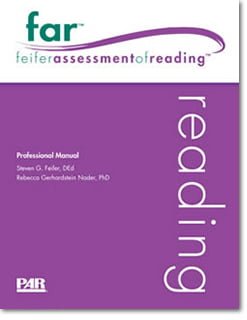
Feifer Assessment of Reading far
Authors: Steven G. Feifer, DEd; Professional Manual by Steven G. Feifer, DEd, and Rebecca Gerhardstein Nader, PhD
Examines the underlying cognitive and linguistic processes that support proficient reading skills
Format: Paper and pencil, Online scoring via PARiConnect, Download, E-Manual
Grade range: Preschool to College
Time: 35 minutes for Preschool; 60 minutes for K-Grade 1; 75 minutes for Grade 2+; 15-20 minutes for Screening Form
Printed Forms & Handscoring Materials
Test forms, response booklets and scoring reference manuals.
Books & Workbooks
Click to browse products
Printed Kits
Click to browse products
Online Forms, Reports, Kits & e-Manuals
All online resources including Forms, Reports, i-Admins, Kits and e-Manuals.
FAR Examinee Response Forms (pkg/10)
FAR Examiner Record Forms (pkg/10)
FAR Laminated Storybook
FAR Stimulus Book 1
FAR Stimulus Book 2
FAR Stimulus Book 3
FAR Comprehensive Kit
FAR In-Person e-Admin Comprehensive Kit
FAR Screening Form online Score Report (each) min order 5
FAR online Interpretive Report (each) min order 5
FAR online Score Report (each) min order 5
The FAR is a comprehensive assessment of reading and related processes. It is unique in that it helps you determine the examinee’s specific subtype of dyslexia to inform decisions about appropriate interventions.
Features and benefits
Addresses four specific subtypes of dyslexia: dysphonic dyslexia, surface dyslexia, mixed dyslexia, and reading comprehension deficits.
Comprises 15 individual subtests measuring various aspects of vocabulary, phonological awareness, decoding skills, rapid automatic naming, orthographical processing, morphological processing, word memory, reading fluency (word and story; silent and oral), and comprehension skills.
Enables you to conduct an item-level skills and error analysis of the examinee’s scores on specific subtests and to take a more in-depth look at his or her reading-related behaviours.
Can be used for an array of purposes, including general screening of dyslexia, progress monitoring of discrete skills for school systems operating in an RTI paradigm, diagnosis of a learning disability as part of a comprehensive psychological evaluation, and design of a deficit- or skill-specific intervention.
A separate screening form is designed to identify children at risk for developmental dyslexia and measure the underlying processes of reading.
Test structure
Five index scores are generated: the Phonological Index, the Fluency Index, the Comprehension Index, the Mixed Index (a composite of Phonological and Fluency index scores), and the FAR Total Index (a composite of all subtest scores).
Examinees in prekindergarten take eight subtests, examinees in kindergarten to Grade 1 take 11 subtests, and examinees in Grade 2 to college take 14 subtests.
You can choose to administer the full battery or, for a shorter administration time, only the subtests associated with an individual reading index, or individual subtests.
Reliable change and discrepancy scores can be calculated.
Scoring is available 24/7 on PARiConnect, our online assessment platform.
Technical information
Offers grade-based norms (with age proxies provided); age and grade equivalents for subtest scores; and confidence intervals, percentile ranks, z scores, and normal curve equivalents (NCEs) for index scores.
Subtest and index scores are scaled to the familiar IQ metric (M = 100; SD = 15).
Standardized on a sample of 1,074 examinees in prekindergarten to college drawn from more than 30 states using a population-proportionate, stratified random sampling plan based on 2012 U.S. Census statistics.
FAR Interpretive Report
Available through PARiConnect, the FAR Interpretive Report provides scores for all 15 FAR subtests and includes detailed interpretations of index, index discrepancy, and subtest scores.
Provides targeted reading interventions that are based on current reading research and tailored to your student’s age and FAR scores.
Save time by easily copying and pasting recommendations into your own report.



